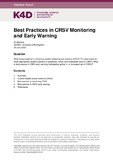Best Practices in CRSV Monitoring and Early Warning
Abstract
Conflict-related sexual violence (CRSV) is a major problem, which has significant negative impacts on victims/survivors, wider society and peace prospects. There is growing international recognition of the need to combat it. CRSV monitoring and early warning are vital in this regard, enabling effective responses and preventive measures. Various factors, notably social stigma, mean that CRSV is vastly under-reported. Best practices to promote CRSV monitoring and early warning include: having appropriate staff (including specialist personnel); engaging with local communities to promote reporting of cases and of warning signals; following principles such as ensuring confidentiality, informed consent and respect for victims/survivors; using standardised data collection templates to facilitate information sharing and analysis; assessing CRSV risks in context against a prepared matrix of early warning indicators; carrying out awareness-raising and advocacy on CRSV; and, where risks are identified, raising the alarm in affected communities.
This review looks at best practices in monitoring conflict-related sexual violence (CRSV), and in CRSV early warning. It draws largely on grey literature, in particular reports of development organisations such as the United Nations. Much of the literature focuses on peacekeeping missions: far less was found with regard to the role of other actors (e.g. NGOs) in CRSV monitoring and early warning. [Note: there is substantial academic literature on the problem of CRSV rather than on best practices to combat it.] In addition, the review found no in-depth evidence (e.g. evaluations) on the experience of applying CRSV monitoring and early warning practices in specific contexts. Given the subject, the available literature does refer to women and girls, but was largely disability-blind.
Citation
Idris, I. (2022). Best practices in CRSV monitoring and early warning. K4D Helpdesk Report 1173. Brighton, UK: Institute of Development Studies. DOI: 10.19088/K4D.2022.126DOI
10.19088/K4D.2022.126Is part of series
K4D Helpdesk Report;1173Rights holder
© Crown copyright 2022Sponsor
Foreign, Commonwealth and Development Office (FCDO)Collections
- K4D [937]

